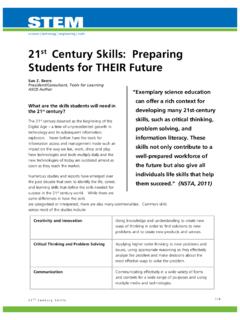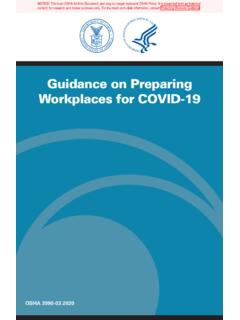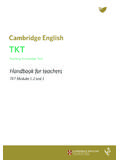Transcription of ROLE OF TEACHERS IN DEVELOPING EMOTIONAL …
1 Vol. 3 No. 2 March, 2015 ISSN: 2320 - 2653. ROLE OF TEACHERS IN DEVELOPING EMOTIONAL INTELLIGENCE. AMONG THE CHILDREN. Dr. P. Karthikeyan Principal, Sri Renugambal College of Education, Ettivadi, Polur - 606 907, Tiruvannamalai Abstract TEACHERS are role models for the students to regulate emotion appropriately in the classroom. EMOTIONAL Intelligence is having three different dimensions which are EMOTIONAL Competency, EMOTIONAL Maturity and EMOTIONAL Sensitivity. EMOTIONAL intelligence four types affects Performance at Work, Physical Health, Mental Health and Relationships. Today's TEACHERS should be able to demonstrate good intellectual, moral, EMOTIONAL and social development and be able to promote the same among the students.
2 teacher plays an important role in the field of Education. Today's Education is child- centered, but the child Education cannot be successful without the teacher . EMOTIONAL intelligence adapts a wider perspective and helps us extend our understanding of our interactions with other and social world around us. Introduction EMOTIONAL Intelligence is an ability to express, manage and control emotions of self and others. Teaching is an EMOTIONAL practice which involves EMOTIONAL Relationships, EMOTIONAL Understanding and EMOTIONAL Labour. TEACHERS have to value EMOTIONAL bonds with students and educate students as EMOTIONAL and social beings. The role of a teacher in the school is a vital one. In fact teaching requires high level of EMOTIONAL Intelligence.
3 Low EMOTIONAL Intelligence brings a host of negative emotions, these consume a great deal of energy, lower self esteem, leads to absenteeism indifference and are effective block to team work. But teacher with high EMOTIONAL Intelligence use more positive well adapted coping strategies when dealing with different sources of stress at school, and feel greater satisfaction with their work. EMOTIONAL Intelligence is a way of recognizing, understanding and choosing how does one think, feel and act. It shapes interactions with others and our understanding of ourselves. EMOTIONAL Intelligence defines how and what to learn. It allows to setting priorities, it determines the majority of daily actions, because EMOTIONAL Intelligence is so closely tied to the ways people relate to themselves and others.
4 Coleman (1995) offered a definition of EMOTIONAL Intelligence as the capacity for recognizing our own feelings and those of others, for motivating our selves, managing emotions well in ourselves and in our relationship. Need of EMOTIONAL Intelligence Over the past several years, it is believed that success in life or at work place depends upon the individual level of intelligence or intelligence quotient as reflected in an Shanlax International Journal of Education 1. Vol. 3 No. 2 March, 2015 ISSN: 2320 - 2653. individual's academic achievement, examination passed, mark obtained etc. But now, research on EMOTIONAL intelligence has revealed that EQ is the most important determinant of the extent of professional and personal success in life.
5 EMOTIONAL Intelligence, playing an important role in determining the individual success in work, family and social life and individual's ability to manage his/her relations efficiently with his/her environment includes the awareness of emotions, judgment of the knowledge related to the emotion and operating on the EMOTIONAL knowledge as a part of problem solving. EMOTIONAL intelligence is an attempt to extend our understanding of intelligence by going beyond what we traditionally measure by intelligence test. EMOTIONAL intelligence adapts a wider perspective and helps us extend our understanding of our interactions with other and social world around us. Dimensions of EMOTIONAL Intelligence EMOTIONAL intelligence is having three different dimensions which are i) EMOTIONAL Competency ii) EMOTIONAL Maturity and iii) EMOTIONAL Sensitivity.
6 All of them are interdependent. i) EMOTIONAL Competency EMOTIONAL Competency constitutes the capacity to trace fully respond the EMOTIONAL stimuli elicited by various situations, having high esteem and optimism, communication, tackling EMOTIONAL upsets such as frustration, conflicts and inferiority complexes, enjoying emotions, doing what succeeds, ability to relate to others, EMOTIONAL self control, capacity to avoids EMOTIONAL exhaustion such as stress burnout, learning to avoid negativity of EMOTIONAL handling egoism. ii) EMOTIONAL Maturity It refers evaluating emotions of one self and others, identifying and expressing feelings, balancing state of heart and mind adaptability and flexibility, appreciating other's point of view, DEVELOPING others delaying gratification of immediate psychological satisfaction.
7 Iii) EMOTIONAL Sensitivity It constitutes understanding threshold of EMOTIONAL arousal, managing the immediate environment, maintaining rapport, harmony and comfort with others, letting others feeling comfortable in one's company. It also involves being honest in inter personal dealing, interpreting EMOTIONAL cues truthfully, realizing communicability of emotions, moods and feelings and having an insight into how others evaluate and relate to us. Impacts of EMOTIONAL Intelligence EMOTIONAL intelligence affects i) Performance at Work, ii) Physical Health, iii). Mental Health and iv) Relationships. There are given below in detail. Shanlax International Journal of Education 2. Vol. 3 No. 2 March, 2015 ISSN: 2320 - 2653.
8 (i) Performance at work EMOTIONAL intelligence can help navigate the social complexities of the workplace, lead and motivate others, and excel in career. In fact, when it comes to gauging job candidates, many companies now view EMOTIONAL intelligence as important as technical ability and require EQ testing before hiring. (ii) Physical health If we are unable to manage stress levels, it can lead to serious health problems. Uncontrolled stress can raise blood pressure, suppress the immune system, increase the risk of heart attack and stroke, contribute to infertility, and speed up the aging process. The first step to improving EMOTIONAL intelligence is to learn how to relieve stress. (iii) Mental health Uncontrolled stress can also impact mental health, making vulnerable to anxiety and depression.
9 If we are unable to understand and manage emotions, it will also be open to mood swings, while an inability to form strong relationships can leave feeling lonely and isolated. (iv) Relationships By understanding emotions and how to control them, we are better able to express how we feel and understand how others are feeling. This allows communicating more effectively and forging stronger relationships, both at work and in personal life. Importance of EMOTIONAL Intelligence for TEACHERS teacher 's have great potential to effect students educational outcomes. TEACHERS are a role model for students on how to regulate emotions appropriately in the classroom. The impact of emotions between teacher and students might play a strong role in the development of teaching style.
10 Today's TEACHERS should be able to demonstrate good intellectual, moral, EMOTIONAL and social development and be able to promote the same among the students. In addition to this, teacher have able to know how to work with the entire educational community, teacher also appears as a dynamic educational agent who together with his or her colleagues and students families, performs not only tasks of preparing and executing the teaching function, but also of mediation, innovation, management, research, assessment and guidance. So teacher is placed as the central axis of the educational community. Significant Role of teacher in Molding EMOTIONAL intelligence The role of teacher is important to study the level of EMOTIONAL Intelligence of the TEACHERS who influence the behaviour of students.




